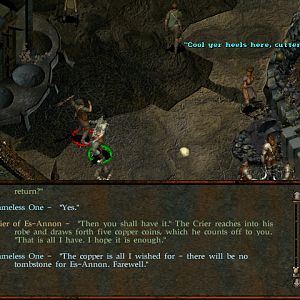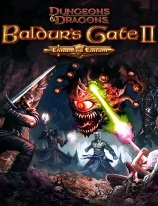-

- Forums
- Chatrooms
- Gallery
- Gameplay Videos
- Upload
- Articles
- Mod Reviews
- Shop SP: Games, Movies, Books

|
|
In short: The Cavalier is an exceptional mounted warrior, best known as the knight of the Middle Ages, who fights for ideals, justice and virtue. The Cavalier receives to hit bonuses with his lance, sword, and mace or flail, which increase as he gains more levels. Because of mental fortitude, the cavalier receives +4 when saving against mind-affecting spells like Charm Person. If at all possible, he must attack with a melee weapon and not a missile weapon. The Cavalier always attacks the biggest and most powerful foes. Cavaliers follow a strict code of chivalry and wavering from that code would result in the character losing their special abilities. Cavaliers must be of any good alignment.
Requirements: Race: Human/Elf/Half-Elf, Strength: 15, Dexterity: 15, Constitution: 15, Wisdom: 10, Intelligence: 10
Description: The Cavalier is the ultimate mounted warrior of civilized cultures, especially those of Middle Ages technology and outlook. In a campaign, he's the shining knight who leads his fellows on an eternal quest for truth, justice, and the elimination of evil. To the world at large, he's a mighty hero. To his friends and allies, he's a staunch friend, a tireless cheerleader, and often an overenthusiastic pain in the neck.
This is a good Warrior Kit for paladins to take. It can be argued that paladins look something like this already, but that isn't necessarily so. Only paladins of cultures resembling medieval Europe would look like this (a paladin of a Japanese-type culture, a paladin of a Polynesian-like culture, and a paladin of a culture resembling later Renaissance Europe world all be very different from the Cavalier). Therefore, a paladin who wants to look every inch the shining knight should take the Cavalier Warrior Kit.
Also, the character must belong to the noble social class in the campaign. It's up to the DM to determine whether this is possible. If his campaign uses a random die-roll to determine who's nobility and who isn't, then the character must first successfully roll to be a noble in order to be a Cavalier. Being a noble does not mean that that he has a lot of money; it is quite likely that he belongs to an impoverished noble family, one with a lot of honorable tradition but no money to speak of. Fighters and paladins may be Cavaliers, while rangers may not.
In his own and similar cultures, the Cavalier is a mighty hero who has the respect of the majority of the population (the criminal classes and evil characters excluded). He has the good-will of the people (reflected as bonuses to his reaction rolls), but the people also make many demands of him. When there's danger, when someone is in trouble, the people turn to the Cavalier for help. This character does not get much time for rest and relaxation.
Weapon Proficiencies: Required: lance (any; player's choice) and sword (any; player's choice). Recommended: all other lances, all other swords, all horsemen's weapons, dagger, spear, javelin.
Armor/Equipment: The Cavalier must start play with (i.e. spend his initial gold on) at least two weapons, including one lance and one sword, and must then buy the most expensive set of armor he can still afford. After those expenditures, whatever remains of his gold an be spent on items of his choice.
At 1st level, he gets a +1 to hit with any lance for which he has proficiency, when using the lance from horseback. This goes up +1 every six experience levels.
At 3rd level, he gets a +1 to hit with any one type of sword (his choice from among those he has proficiency with; most common are broad sword, long sword, bastard sword, and scimitar). This goes up +1 every six experience levels.
At 5th level, he gets a +1 to hit with either horseman's mace, horseman's flail, or horseman's pick (his choice from among those he has proficiency with). This goes up +1 every six experience levels. These pluses to hit do not add to damage, and don't allow the Cavalier to hit a monster that can only be hit by magical weapons.
The Cavalier is completely immune to the Fear spell. Because he is so brave, he inspires others to courage, and so, while he is fighting, he actually radiates an Emotion spell in a 10' radius. This Emotion spell radiates Courage, but only to the extent that it negates fear. The Cavalier has +4 to save vs. all magic which would affect his mind, such as the wizard spells Charm Person, Friends, Hypnotism, Sleep, Irritation, Ray of Enfeeblement, Scare, Geas, and the clerical spells Command, Charm Person or Mammal, Enthrall, Cloak of Bravery and Symbol.
The Cavalier should start play with a horse which he does not have to pay for (should because there won't be any horses you can ride in Baldur's Gate II...). The Cavalier receives a +3 reaction adjustment from anyone of his own culture (except criminals and characters of evil alignment, from which he receives a -3). And finally, the Cavalier has the right to demand shelter. When he travels, he can demand shelter from anyone in his own nation who is of his own status or lower than nobility. Most people of his own status or higher will be happy to offer him shelter when he is traveling.
For all those benefits the Cavalier has some pretty hefty hindrances as well. The cavalier cannot attack an opponent at range if he can instead charge ahead and attack him in melee or jousting combat. Therefor, he cannot snipe on enemies with a bow or crossbow; he cannot use a polearm from behind a shield wall. He has to be in the front line, meeting his foe face-to-face (a Cavalier could conceivably shoot an opponent with an arrow to stop that opponent from killing an innocent person; that doesn't constitute a violation of his code. But he couldn't shoot the enemy to protect a friend if his friend is fighting that enemy honorably, even if his friend is losing).
In any combat, the Cavalier must attack the enemy who is the biggest and most powerful looking. If he's held up by lesser troops, he must dispatch them as quickly as possible to get to his "real" opponent. He must always have the highest-quality armor he can afford. His goal is to have a full set of full plate armor; the next step down from that is field plate, then plate mail, then bronze plate mail, then banded or splint, then chain, then scale or brigandine, then ring or studded. And to him, magic bonuses don't mean as much as as the type of armor, he prefers a suit of ordinary field plate to a set of banded mail +5.
The cavalier must also follow the very strict code of Chivalry. He must cheerfully perform any noble service or quest asked of him; he must defend, to death, any person or item placed in his charge; he must show courage and enterprise when obeying his rulers; he must show respect for all peers and equals; he must honor all those above his station; he must demand respect and obedience from those below his station; he must scorn those who are lowly and ignoble (he will not help the ill-mannered, the coarse, the crude; he will not use equipment which is badly-made or inferior; he will fight on foot before riding a nag, etc.); he must perform military service to his lord whenever asked; he must show courtesy to all ladies (if the Cavalier is male); he must regard war as flowering of chivalry, and a noble enterprise; he must regard battle as the test of manhood, and combat as glory; he must achieve personal glory in battle; he must slay all those who oppose his cause; and he must choose death before dishonor.
If a Cavalier chooses not follow this code, bad things happen. The first time he breaks his vows, the DM will warn the player that the Cavalier feels bad about violating his code. The second time he breaks his vows, the cavalier loses all his special benefits until such time as he respects and undertakes a dangerous task to redeem himself. When performing this task, he must behave according to his code and his hindrances. Only when the task is successfully accomplished does he regain his benefits.
If the Cavalier breaks his vow a third time without repenting and undertaking that task, he has abandoned his Cavalier warrior kit. He permanently loses all the special benefits of the kit. He no longer has to obey his knightly code. He receives a permanent -3 reaction adjustment from all members of his own culture (even those who do not know about his past will be put off by the air of treachery and faithlessness that now haunts the man).
Source: The Complete Fighter's Handbook


